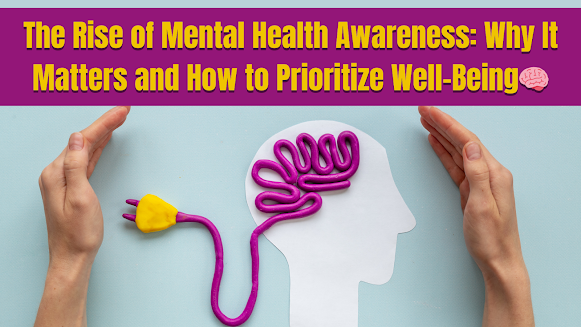 |
| The Rise of Mental Health Awareness: Why It Matters and How to Prioritize Well-Being 🧠 |
The Rise of Mental Health Awareness: Why It Matters and How to Prioritize Well-Being 🧠💙
Mental health awareness has become one of the most important conversations in recent years. As people face increasing stress from work, relationships, social media, and life challenges, prioritizing mental well-being is no longer optional—it’s essential.
This blog explores the importance of mental health awareness, common mental health challenges, and practical strategies to maintain emotional well-being in daily life.
📌 Why is Mental Health Awareness Important?
✔️ Reduces Stigma – Many people avoid discussing mental health due to fear of judgment. Raising awareness encourages open conversations.
✔️ Encourages Early Intervention – Recognizing symptoms early helps prevent serious conditions like anxiety, depression, or burnout.
✔️ Improves Productivity & Relationships – Good mental health enhances focus, communication, and work-life balance.
✔️ Saves Lives – Spreading awareness about mental health issues and suicide prevention can help those struggling in silence.
💡 Did you know? According to the World Health Organization (WHO), more than 280 million people worldwide suffer from depression, and mental health disorders are among the leading causes of disability.
🧠 Common Mental Health Challenges
Mental health issues can affect anyone, regardless of age, profession, or background. Here are some of the most common challenges:
1️⃣ Anxiety Disorders
- Excessive worrying, panic attacks, and restlessness.
- Common types include Generalized Anxiety Disorder (GAD), Social Anxiety, and OCD.
2️⃣ Depression
- Persistent sadness, loss of motivation, and lack of interest in daily activities.
- Can lead to fatigue, sleep problems, and suicidal thoughts if untreated.
3️⃣ Burnout & Work Stress
- Feeling mentally drained due to work pressure and lack of work-life balance.
- Common among corporate employees, entrepreneurs, and healthcare workers.
4️⃣ Social Media Fatigue
- Constant comparison, cyberbullying, and pressure to maintain a perfect image.
- Leads to low self-esteem, anxiety, and emotional exhaustion.
5️⃣ PTSD & Trauma
- Post-Traumatic Stress Disorder (PTSD) occurs after experiencing a deeply distressing event.
- Symptoms include flashbacks, nightmares, and heightened fear responses.
💡 Tip: If you experience any of these symptoms for more than two weeks, seeking professional help is the best step toward healing.
💡 10 Practical Ways to Take Care of Your Mental Health
1️⃣ Practice Mindfulness & Meditation 🧘♂️
- Spend 5-10 minutes daily focusing on your breath and surroundings.
- Helps reduce anxiety and overthinking.
2️⃣ Stay Physically Active 🏋️♀️
- Exercise releases endorphins (happy hormones), improving mood.
- Walking, yoga, or gym workouts can help reduce stress and depression.
3️⃣ Maintain a Healthy Diet 🥗
- Avoid processed foods and excessive caffeine.
- Include foods rich in Omega-3, magnesium, and Vitamin D for brain health.
4️⃣ Set Work-Life Boundaries 🚀
- Take regular breaks and set limits on work hours.
- Avoid checking work emails after hours to reduce burnout.
5️⃣ Reduce Social Media Usage 📵
- Limit doom-scrolling and unfollow accounts that trigger stress.
- Take social media detoxes to improve real-life interactions.
6️⃣ Get Enough Sleep 😴
- Maintain 7-8 hours of quality sleep for better mental clarity.
- Avoid screens 30 minutes before bedtime.
7️⃣ Engage in Hobbies 🎨🎸
- Do activities you love—reading, painting, gardening, or music.
- Helps distract from stress and increases happiness.
8️⃣ Talk About Your Feelings 🗣️
- Share emotions with trusted friends, family, or therapists.
- Helps process negative emotions instead of bottling them up.
9️⃣ Seek Professional Help 👩⚕️
- Therapy and counseling provide coping mechanisms for mental health struggles.
- Apps like BetterHelp & Talkspace offer online therapy.
🔟 Practice Gratitude 🙏
- Write 3 things you’re grateful for every day.
- Shifts focus from negativity to positivity and self-growth.
💡 Tip: Small daily habits create long-term mental resilience!
📈 The Role of Society in Mental Health Awareness
Mental health awareness isn’t just an individual responsibility—it requires societal change. Here’s how we can contribute:
✔️ Encourage Open Conversations – Talk about mental health without stigma.
✔️ Promote Mental Health Education – Schools and workplaces should integrate mental health discussions.
✔️ Support Those in Need – Offer emotional support and encourage seeking help.
✔️ Advocate for Better Policies – Demand better mental healthcare systems and policies.
💡 Did you know? Some workplaces now offer mental health days as part of their benefits, recognizing the importance of psychological well-being.
💰 Mental Health Awareness & Monetization Opportunities
If you're passionate about mental health, here are ways to create content and earn while spreading awareness:
1️⃣ Blogging & YouTube
- Start a blog on self-care, mindfulness, or mental health tips.
- Monetize through Google AdSense, sponsorships, and affiliate links.
2️⃣ Online Courses & E-books
- Create guided meditation programs or self-care workbooks.
- Sell on platforms like Gumroad, Udemy, or Teachable.
3️⃣ Counseling Services
- If certified, offer online therapy or coaching sessions.
- Use BetterHelp, Talkspace, or private websites.
4️⃣ Social Media Awareness Pages
- Start an Instagram or TikTok page sharing mental health tips.
- Monetize via brand partnerships and paid promotions.
💡 Tip: If you’re a content creator, use SEO-friendly mental health keywords to reach a wider audience.
🚀 Final Thoughts: Why Mental Health Awareness Matters
Mental health is just as important as physical health. By prioritizing well-being, engaging in self-care, and supporting others, we can build a mentally healthier world.
✔️ Recognize mental health challenges.
✔️ Practice self-care habits.
✔️ Encourage mental health awareness in communities.
🎯 Your mental health matters! Start small, seek help when needed, and create a lifestyle that supports your emotional well-being.




No comments:
Post a Comment